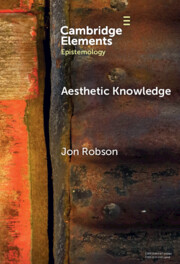Refine search
Actions for selected content:
390 results
5 - Theology as a Science
- from Part II - Theological Themes
-
-
- Book:
- The Origins of Scholasticism
- Published online:
- 18 November 2025
- Print publication:
- 08 January 2026, pp 157-182
-
- Chapter
- Export citation
Introduction
-
-
- Book:
- Hume's <i>A Treatise of Human Nature</i>
- Published online:
- 05 December 2025
- Print publication:
- 08 January 2026, pp 1-10
-
- Chapter
- Export citation
Chapter 5 - Space
- from Part II - Making Improvement Material
-
- Book:
- Violent Waters
- Published online:
- 17 December 2025
- Print publication:
- 08 January 2026, pp 123-154
-
- Chapter
- Export citation
Chapter 2 - Method and Epistemology
- from Part I - Method, Metaphysics, and Epistemology
-
- Book:
- The Philosophy of Antoine Arnauld
- Published online:
- 27 November 2025
- Print publication:
- 11 December 2025, pp 25-49
-
- Chapter
- Export citation

Hume's A Treatise of Human Nature
- A Critical Guide
-
- Published online:
- 05 December 2025
- Print publication:
- 08 January 2026

The Philosophy of Antoine Arnauld
-
- Published online:
- 27 November 2025
- Print publication:
- 11 December 2025
Decolonizing mental health: Rethinking implementation science from the ground up
-
- Journal:
- Cambridge Prisms: Global Mental Health / Volume 12 / 2025
- Published online by Cambridge University Press:
- 27 November 2025, e146
-
- Article
-
- You have access
- Open access
- HTML
- Export citation
3 - Maṣlaḥa in Ibn ʿAbd al-Salām’s Legal Philosophy
-
- Book:
- An Islamic Legal Philosophy
- Published online:
- 19 November 2025
- Print publication:
- 27 November 2025, pp 103-133
-
- Chapter
- Export citation
Of Cattle and Community: Women’s History-telling in Western Uganda’s Nanga Performances, 1900–Present
-
- Journal:
- The Journal of African History / Volume 66 / 2025
- Published online by Cambridge University Press:
- 21 November 2025, e27
-
- Article
-
- You have access
- Open access
- HTML
- Export citation
Introduction to a Symposium on Radical Skepticism and Epistemic Intuition
-
- Journal:
- Canadian Journal of Philosophy , FirstView
- Published online by Cambridge University Press:
- 21 November 2025, pp. 1-3
-
- Article
-
- You have access
- Open access
- HTML
- Export citation
Chapter 9 - Qualitative Research
- from Section 2 - Tools and Methodologies
-
-
- Book:
- Research Methods in Mental Health
- Published online:
- 31 October 2025
- Print publication:
- 20 November 2025, pp 135-155
-
- Chapter
- Export citation

Aesthetic Knowledge
-
- Published online:
- 11 November 2025
- Print publication:
- 04 December 2025
-
- Element
- Export citation
Chapter 19 - Making Audiences
- from Part IV - Worlds of Print
-
-
- Book:
- African Literature in Transition
- Published online:
- 23 October 2025
- Print publication:
- 06 November 2025, pp 374-391
-
- Chapter
- Export citation
10 - Saving the Appearances: The Direction of Time and Time-Reversal Invariance
- from Part III - The Arrow of Time and Time-Reversal Invariance
-
-
- Book:
- The Arrow of Time
- Published online:
- 28 October 2025
- Print publication:
- 30 October 2025, pp 198-222
-
- Chapter
- Export citation
Chapter 4 - Bloomsbury and the New Biography
- from Part I - Aesthetic Bloomsbury
-
-
- Book:
- A History of the Bloomsbury Group
- Published online:
- 09 October 2025
- Print publication:
- 23 October 2025, pp 52-67
-
- Chapter
- Export citation
Remembering Lysenko: when ideology and science meet
-
- Journal:
- The British Journal of Psychiatry , FirstView
- Published online by Cambridge University Press:
- 25 September 2025, pp. 1-3
-
- Article
-
- You have access
- HTML
- Export citation
Against Causal Conditions
-
- Journal:
- Episteme , First View
- Published online by Cambridge University Press:
- 18 September 2025, pp. 1-12
-
- Article
-
- You have access
- Open access
- HTML
- Export citation
Virtuous Belief Outsourcing
-
- Journal:
- Episteme , First View
- Published online by Cambridge University Press:
- 01 September 2025, pp. 1-16
-
- Article
-
- You have access
- Open access
- HTML
- Export citation
The New Instrumental Turn in Nigerian Historical Scholarship
- Part of
-
- Journal:
- The Journal of African History / Volume 66 / 2025
- Published online by Cambridge University Press:
- 01 September 2025, e11
-
- Article
-
- You have access
- Open access
- HTML
- Export citation
Chapter 3 - Knowledge Doesn’t Exist
-
- Book:
- Knowledge Doesn't Exist and Other Thoughts on Critical Thinking
- Published online:
- 22 October 2025
- Print publication:
- 21 August 2025, pp 32-45
-
- Chapter
- Export citation
